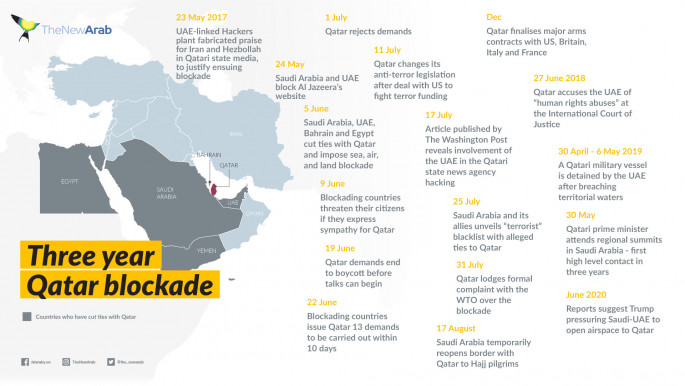
Qatar boldly defends Arab Peace Initiative at UN
Instead, since mid-2017 the Qataris have proven capable of protecting their sovereignty and conducting a foreign policy based on their national vision - not those of its immediate neighbours.
On 22 September, the world listened to Emir Tamim bin Hamad Al Thani address the 75th session of the United Nations General Assembly. His video address was the latest sign of Qatar's independence, which has enabled Doha to stand by its foreign policy positions on a host of global issues notwithstanding the blockade.
Speaking before a global audience, Emir Tamim called out the international community for failing to "take any effective action to confront Israeli intransigence and its continued occupation of Palestinian and Arab land." Qatar's head of state urged the UN Security Council to "compel Israel to lift the siege of the Gaza Strip, and to put the peace process back on track through credible negotiations based on international resolutions and not on force".
Emir Tamim asserted that "failure to find a just solution to the Palestinian cause, Israel's continued settlements, and forcing a reality on the ground without being deterred, this is what raises the biggest question about the credibility of the international community and its institutions."
 |
Since mid-2017 the Qataris have proven capable of protecting their sovereignty and conducting a foreign policy based on their national vision |  |
For Doha, this speech was an opportunity to emphasise that Qatar - unlike some Gulf Cooperation Council (GCC) members - refuses to abandon the Arab Peace Initiative (API).
As Qatar's leader stated, "Peace can only be achieved when Israel fully commits to the international terms of reference and resolutions that are accepted by the Arab countries and upon which the API is based." At a time in which the number of Arab states standing by the API is dwindling, Qatar's leadership sees it as important to raise the Palestinian issue and advocate for a just solution through international forums while emphasising the need to uphold international law.
This speech was intended mainly for an audience in Washington. "Qatar together with Kuwait are the firmest [within the GCC] on telling the Trump administration that [refusal to normalise] has nothing to do with Israel per se, but there cannot be a normalisation with Israel if there is no normalisation with a Palestinian state," explained Dr Andreas Krieg, an Assistant Professor at the Defence Studies Department at King's College London.
 |
|
| [Click to enlarge] |
"The Qataris are telling the Americans: 'You need to recognise a Palestinian state and prepare the ground for a safe and just division of land in Palestine between an Israeli and Palestinian state.'"
The Emir's speech was a bold rebuke, especially given how soon it came after the Abraham Accords ceremony at the White House. Although the Trump administration is pressuring more governments in the Islamic world to normalise relations with Israel, Doha is clearly not moving in the direction in which Secretary of State Mike Pompeo and White House advisor Jared Kushner are trying to push more Middle Eastern and African countries.
Qatar and the US's foreign policy differences vis-à-vis Palestine are not new. For many years, officials in Doha have been open with their counterparts in Washington about Qatar's strong support for the API and their willingness to mediate deals with Hamas.
Read more: Naming Qatar a major non-NATO ally
However, it does not appear that the US and Qatar's close ties will suffer from Doha's steadfast support for the API. Considering that US Deputy Assistant Secretary for Arabian Gulf Affairs Timothy Lenderking explained that Washington hopes to name Qatar a major non-NATO-ally only six days after the announcement of the Bahrain-Israel diplomatic agreement, Doha and Washington can evidently maintain close relations and continue partnering on many issues, even if Qatar and the US agree to disagree on the Palestinian-Israeli conflict.
 |
It does not appear that the US and Qatar's close ties will suffer from Doha's steadfast support for the API |  |
Moreover, it is safe to argue that the Trump administration and future ones will benefit from Qatar refusing to follow Abu Dhabi and Manama's lead in opening fully-fledged diplomatic relations with Tel Aviv. Doha's ability to serve as a diplomatic bridge between Hamas, on one side, and Israel and the US, on the other, depends on maintaining a fair and balanced position.
On 1 September, Israel's President Reuven Rivlin put out a tweet saying that he thanked Qatar's special envoy to Palestine Ambassador Mohammed al-Emadi for his "[commitment] and his intensive efforts to stop the escalation and to calm the situation" in Israel/Gaza. President Rivlin was referring to ambassador Emadi and his delegation's arrival in Gaza on 25 August, which led to discussions with Hamas that produced a Qatari-brokered Hamas-Israel deal within six days.
As Dr. Krieg put it, for those around Trump "to work with the Qataris as a mediator in the region, they will have to accept that the Qataris will take a balanced approach on all these conflicts, and they can't choose one over the other, which is why why the Qataris unlike other Gulf countries, get a pass [from the White House] on not normalising relations with Israel."
Giorgio Cafiero is the CEO of Gulf State Analytics, a Washington, DC-based geopolitical risk consultancy.
Follow him on Twitter: @GiorgioCafiero
Opinions expressed in this article remain those of the author and do not necessarily represent those of The New Arab, its editorial board or staff.





 Follow the Middle East's top stories in English at The New Arab on Google News
Follow the Middle East's top stories in English at The New Arab on Google News


